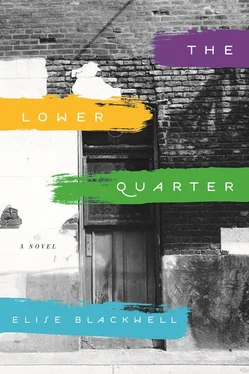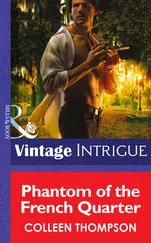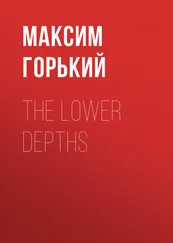Eli nodded. “Yes. Yes, I am.”
“Would you die before you hurt her?”
“Yes. Yes, I would.”
“Would you go back to prison before you hurt her?”
The question didn’t surprise him, and he nodded. “Yes, I would.”
Now Clay closed himself off, leaning forward onto his knees, palms clasped, face cast down and shown to Eli only at an acute angle. His question was barely audible: “Does she love you? Can you make her happy?”
Eli thought carefully before saying, “I don’t know, but yes, I think so.”
Still Clay didn’t look up, but he spoke louder now. “Then you need to stay calm and wait. While anyone cares about that painting, Johanna is in danger — from herself as well as from others. You get that, right? You’re not stupid?”
Again Eli nodded even though Clay wasn’t looking at him.
“When that’s no longer true, no one will care about her.”
“There’s a cop, too, looking into the dead man.”
“Mouton?” Clay laughed. “Mouton won’t do anything he’s not paid to do. He’s got a stack of cases to last his lifetime. No way is he going to take time to solve one no one wants solved. People are gunning each other down not so far from here, yesterday and today and tomorrow, and he won’t solve those murders, either.”
“Well, he seemed more than a little interested, and very recently at that.” Eli pointed at his nose. “Anyway, what about your father? I assume he’s writing the paychecks you’re talking about.”
“My father will continue to be the asshole he has always been, but by next week his interests will no longer include the later work of Eugeen van Mieghem. As you said, the painting isn’t worth that much money. Speaking of Mouton, by the way, when you see Johanna, tell her he’s the one who did the footwork. Assuming is wasn’t you, and I suspect you didn’t pack a suit for this trip if you own one at all. You probably own exactly one, right? Anyway, you’ll be putting her mind to rest on something and doing yourself a favor in the process by telling her it was Mouton.”
Eli closed his eyes and let Johanna’s face resolve on the backs of his lids or his mind’s eye or wherever the physical location of visual imagination lies. Eli liked to think of it as a place. He opened his eyes abruptly on the pale young man. “If people operate by pride and greed and power, what do you get out of all this — whatever this is?”
“You left revenge out of your list. What I get is my own version of revenge. But sometimes some of us are capable of a little more, something bigger than ourselves, at least if it coincides with self-interest. I guess the word for me is justice. Revenge is part of it but not all of it. There’s getting even but also making things even.”
Eli nodded. “Okay.”
“Just so you know,” Clay added, “the only reason you’re getting anything out of this at all or playing any part at all is because I ran out of time. My hand was forced early.”
“Okay,” Eli said again. “I can trust in duress a lot more than I could ever trust in generosity. Or justice.”
“You may be a good man — that’s probably what I would decide if I had time to test my conclusions — but I am not a good man. You’ve got nothing to worry about there. It’s the one thing you can trust me on.”
Clay
Having sent in the page proofs of his final book, made plans for the money that would be left after his orders were followed, and decided that his only farewell to his father would be by mail, Clay was finished with the city. As he watched it turn murky below him, he regretted that he had only ever taken it for granted. He had traveled to many places that might have given him perspective, had lived overseas, yet he’d only ever thought of New Orleans as his family’s home. He’d always blamed the city for that, which was a mistake now too late to rectify. He drank his first-class wine and allowed himself the pleasure of a regret merging with nostalgia, savoring how maudlin it all was.
The shimmering hues of Johanna’s hair in an autumn light dappled and waved by the flora of Ochsner Island produced a sharper regret, a pain no less real because it was vague, but he swallowed it away with the nectar of the gods. As soon as the seatbelt sign was extinguished, he would ask for another glass.
In the overhead compartment rested an architect’s bag holding the frame of an empty canvas nearly the exact size of a modestly well-known Belgian artist’s painting of a young woman waiting to depart from a dock in Antwerp — a painting that would not be recrossing the Atlantic to its home country because it sat in a poorly furnished shotgun duplex in the Bywater. That black bag and his father’s name would gain him entry to the residence of a very wealthy man living between Brussels and Antwerp — a man whose familial power and affluence dated back far beyond the Fontenots of New Orleans, very nearly to the Middle Ages.
It was a family whose name was well enough known that Clay could depend that the man’s mysterious stabbing (“Nothing stolen!”) would make at least a few European newspapers and that he would be able to purchase one from the safety of a country that was not Belgium — the country where his British contact would meet to take care of his final business, his final human remains. It would be this man who would mail two copies of the newspaper story to New Orleans. One would go into a card together with a small leather bookmark inscribed with Clay’s full name. The envelope would bear his father’s name. The card would bear Clay’s handwriting but not his signature: “Sorry you won’t be able to buy that thing you wanted after all.” The informality of it delighted Clay. The other clipping would go to Johanna, part of his final gift to her and evidence of the other portion of that gift.
The stabbing itself was the only variable he could not predict in all its details, but he trusted his research and his choice of method. Most of all, he trusted his resolve. And his experience: Even if the first death by his hand had not been planned, he knew at least that he could take human life. The man’s painting, the one his father so badly wanted, would remain in the stately home, perhaps in the very room Johanna hated above all others, to be embroiled in an estate war that might well outlast his father’s arteries. Clay guessed, too, that any investigation into the painting’s provenance might point to a more rightful owner. An accidental good deed done on the side, perhaps making up for some small harm he’d caused in his life’s work without realizing it — some unknown collateral damage with his name on it.
After draining his glass, Clay worked two fingers between the buttons of his shirt and made contact with the soft, flawless skin of his stomach — his most beautiful material.
Marion
Her shift was busy, her mood strangely buoyant. Whenever she caught herself trying to dissect the buoyancy, she stopped, telling herself to enjoy floating on the surface of her life for a change.
On her way home, she walked her bike the first couple of blocks, pausing to look into Johanna’s workshop, which was empty. She saw the light on in the upstairs window and figured that Johanna lived up there. She imagined her making tea, or reading, or washing her face. All guesses — she knew nothing about Johanna’s life even though she had envied it, or envied what it might be. She wondered what Johanna was to Clay and Clay to her, but it didn’t really matter. She liked both of them, in the end, yet she would also be glad to be done with them and with everything else the storm had brought into her life. Eddie was the exception; she had chosen him.
She pedaled the rest of the distance home, enough tips in her purse to treat Henry to a meal out. Maybe she’d call and invite Eddie, too, though she wasn’t sure she wanted to mix friend and family just yet. She and Henry were building a new relationship, not resuming an old one, and so they still circled carefully, practiced a civility that would remain artificial as long as it had to be practiced.
Читать дальше












